Support strong Canadian climate journalism for 2025
The Canadian boss of a Texas multinational energy company promoting a major oil industry expansion project says he's not "smart enough" to say how much human activity is contributing to climate change.
Kinder Morgan Canada president Ian Anderson made the comments on Thursday at a Greater Vancouver Board of Trade meeting just as environmental activists were staging sit-ins at government offices warning that the project, the controversial Trans Mountain pipeline expansion, would push Canada's climate change goals out of reach.
Climate change has been one of the dominant themes in the public debate surrounding the pipeline project, and Anderson's comments prompted one local mayor to suggest the industry executive was in "denial" about universally accepted scientific evidence.
If built, the Trans Mountain expansion would triple the capacity of an existing pipeline network that links the Edmonton and Vancouver regions, shipping roughly 890,000 barrels of crude oil and petroleum per day. As a result, it would help Canada's oilsands industry, the nation's fastest growing source of heat-trapping carbon pollution, expand by giving it access to new markets overseas from an oil terminal on the coast in Burnaby, B.C.
Anderson said there are two distinct paths of climate science and he wouldn't "judge one path versus the other," as he touted the economic and employment benefits of the project.
"We won't all agree on the science or the degree to which man influences greenhouse gases and climate change," he said. "I've read the science on both sides and don’t pretend to be smart enough to know which is right."
His comments also came only days after the World Meteorological Organization (WMO) reported that 2016 was the hottest year on record, and that the concentration of carbon pollution in the atmosphere had reached levels not seen in roughly three million years.
Concern over carbon
In a media scrum afterwards, the pipeline executive told reporters he recognized that over time, society should seek to "minimize the impacts of those (fossil fuels)," but that he doesn't know enough to make a personal evaluation on the topic.
The remarks prompted his company to issue a statement later in the day that noted how he felt the discussion around climate change was an important one.
"The discussion around climate change is an important one and one that I have not shied away from," Anderson explained in the release. "There should be no misunderstanding in what I think or believe. Climate change is real. Fossil fuels lead to higher CO2, which in turn contributes to climate change."
Anderson's indecision coincides with the release of a final report from a special panel appointed by the Trudeau government to collect additional public feedback on the Trans Mountain expansion, and determine whether there were gaps in the initial review initiated by the former Harper government and carried out by the National Energy Board. The panel didn't make recommendations against or in favour of the Trans Mountain expansion, but noted that there wasn't enough evidence available to determine whether the project — described as being among the most "controversial in the country, perhaps in the world, today" — was in the public interest.
The NEB recommended in May that the government approve the project, subject to 157 environmental, financial, and technical conditions.
While these conditions included — for the first time in Canadian history — a requirement to quantify the direct greenhouse gas emissions after construction and offset them, the project's detractors have argued that in its evaluation of the pipeline, the NEB should have considered upstream and downstream greenhouse gas emissions, which relate to the extraction and production of oil shipped in the pipeline.
The project is expected to generate more than one million tonnes of emissions annually as it opens up access to Canadian oil for overseas buyers in Asia and Europe, creating more than $46 billion in government revenue for provincial and federal governments along the way, and at least 15,000 jobs per year during construction.
"We live in a highly competitive world," said Jeff Gaulin, vice-president of the Canadian Association of Petroleum Producers (CAPP), the primary sponsor of Thursday's event. "The status quo is no longer good enough. Without more capital and more infrastructure projects such as pipelines, we won't be able to sustain that type of prosperity and jobs."
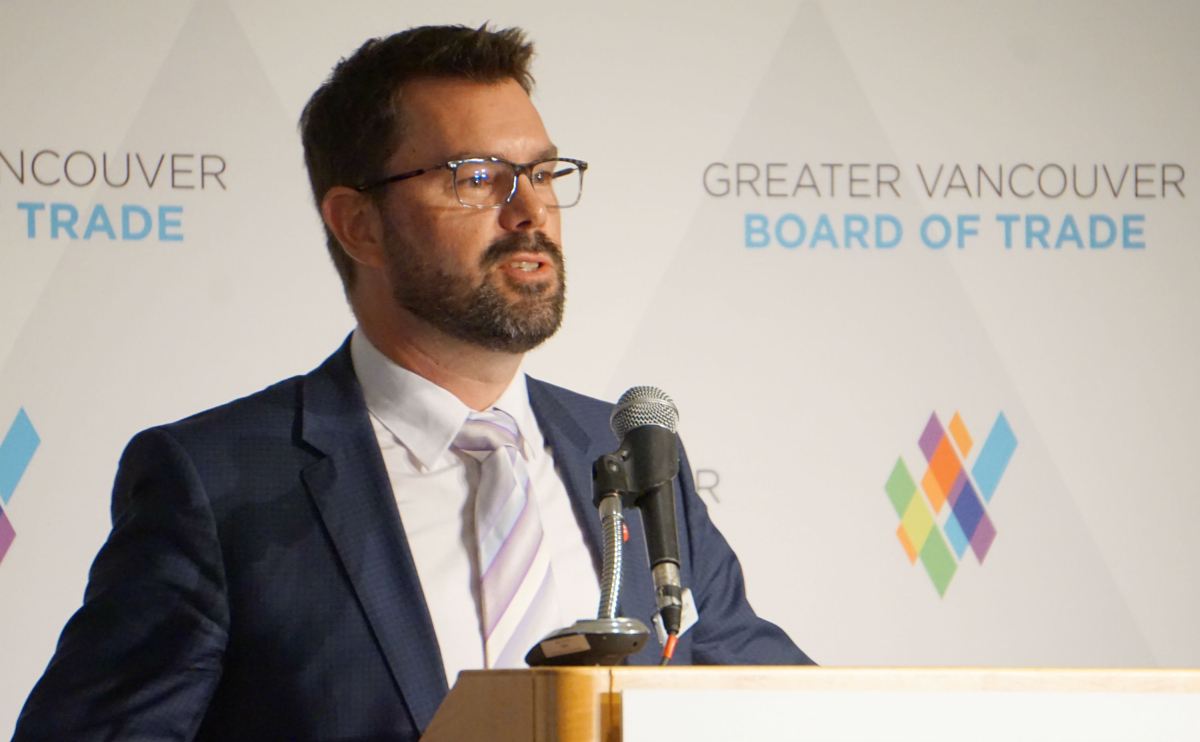
Constant protest across Canada
Despite both his and Anderson's assurances that the Trans Mountain pipeline would bolster Canadian economies during "tough times" and can be operated safely, the project remains the subject of heavy protest across Canada. More than a week ago, 99 students were arrested in Ottawa during a mass demonstration against the expansion, and on Thursday morning, opponents started sitting in the offices of Natural Resources Minister Jim Carr and Indigenous Affairs Minister Carolyn Bennett to put pressure on them to publicly oppose it.
At the Board of Trade meeting in Vancouver, armed police officers were even present to make sure protestors in the hotel lobby didn't get out of control or get close enough to disrupt the conference, entitled 'Pipeline Success: Getting to Yes Takes a Willingness to Listen and Learn.' Only a handful of demonstrators showed up however, quietly holding signs reading, "Stop Kinder Morgan," and "No pipelines."
"Justin Trudeau has very clearly said that communities grant permission for projects like these and we have clearly said no many times," said demonstrator Ariel Martz-Oberlander. "We're here to just remind them our answer is no, and our 'no' doesn't mean a maybe, and our 'no' doesn't mean convince us."
She said she and other protestors fully expect the Trudeau government to approve the Trans Mountain expansion, and if he does, she will be there.
"We're just going to meet them wherever they come," she told National Observer. "We're going to continue to show up wherever Trudeau goes. We're also going to be sitting on Burnaby Mountain when it comes to it. We're there every step of the way."
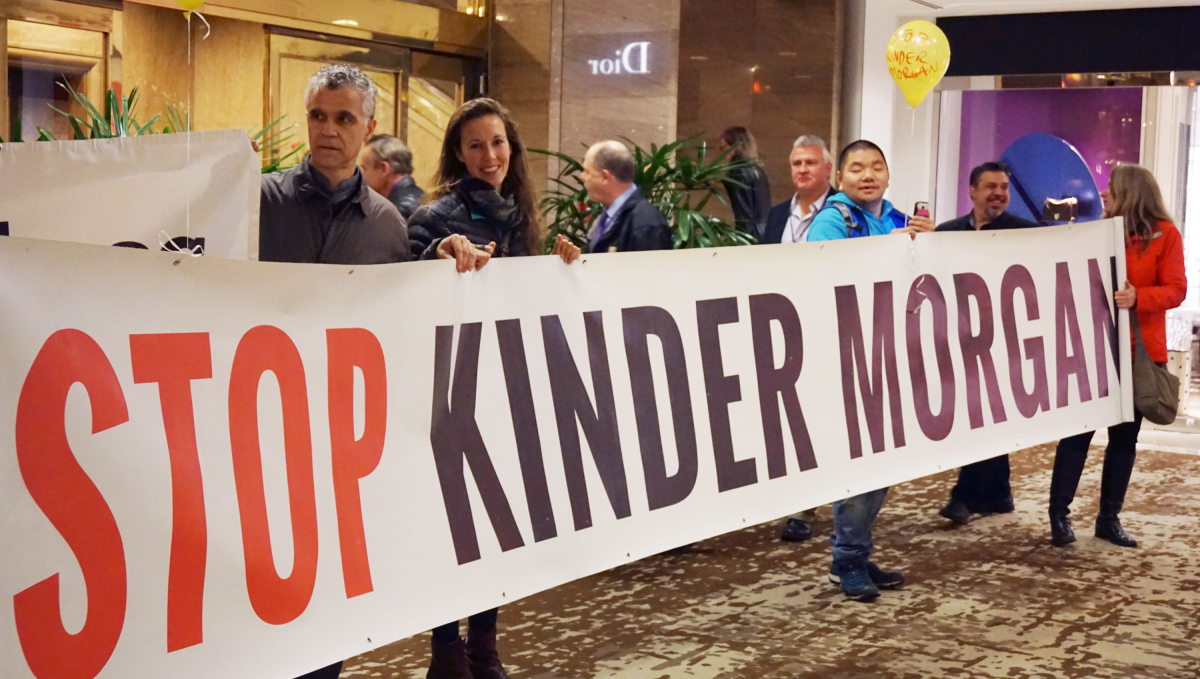
Anderson's comments "pathetically inadequate," says Burnaby mayor
When asked if it thought Anderson's indecision had a negative impact on efforts to gain social license for the project, or whether it clashed with the government's own take on human contributions to global warming, Natural Resources Canada declined to comment. In an email statement, it did however emphasize the importance of having both a strong economy and healthy environment, and said it would make its decision on the project by combining both considerations:
"The Government will make its decision on the proposed Trans Mountain Expansion project by December 19, 2016," said ministry spokesperson Danica Vaillancourt. "In making this decision, the Government will consider the Ministerial panel’s report which was released today, responses to the online questionnaire, the National Energy Board’s recommendation report, Environment and Climate Change Canada’s assessment of upstream greenhouse gas emissions and extensive Crown consultations that were undertaken with Indigenous peoples."
Burnaby Mayor Derek Corrigan — one of the most vocal opponents to the pipeline — was less reserved in his evaluation of Anderson's comments, however, and said he was "stunned" with the executive's apparent denial. His municipality was locked in litigation with Kinder Morgan for at least two years over protests and opposition to the project itself.
"For a man who is in an industry like that, it seems to be pathetically inadequate," he told National Observer. "It’s a pretty short read for anything on the other side of the debate because the conclusion that’s been drawn is almost universal.
"The vast preponderance of expertise is on the side of humans being responsible for climate change... I'm stunned that Ian Anderson is in denial about something as clearly based on scientific evidence as the idea of human impact and climate change."
Kinder Morgan's Ian Anderson once did a climate change
After the controversy, Kinder Morgan's communications team also sent a link to a Trans Mountain blog post where Anderson talks in-depth about climate action and the pipeline expansion for additional context. That blog post still quotes Anderson as being unsure about the extent of human impact on global warming:
"I believe that thoroughly understanding human generated impacts on climate change will only be known sometime in the future, but we can’t afford to minimize the risks," he said in the piece, dated Dec. 1, 2015.
Editor's Note: This story was updated at 4:20 p.m. to include a new statement from Ian Anderson sent by the Trans Mountain communications team.

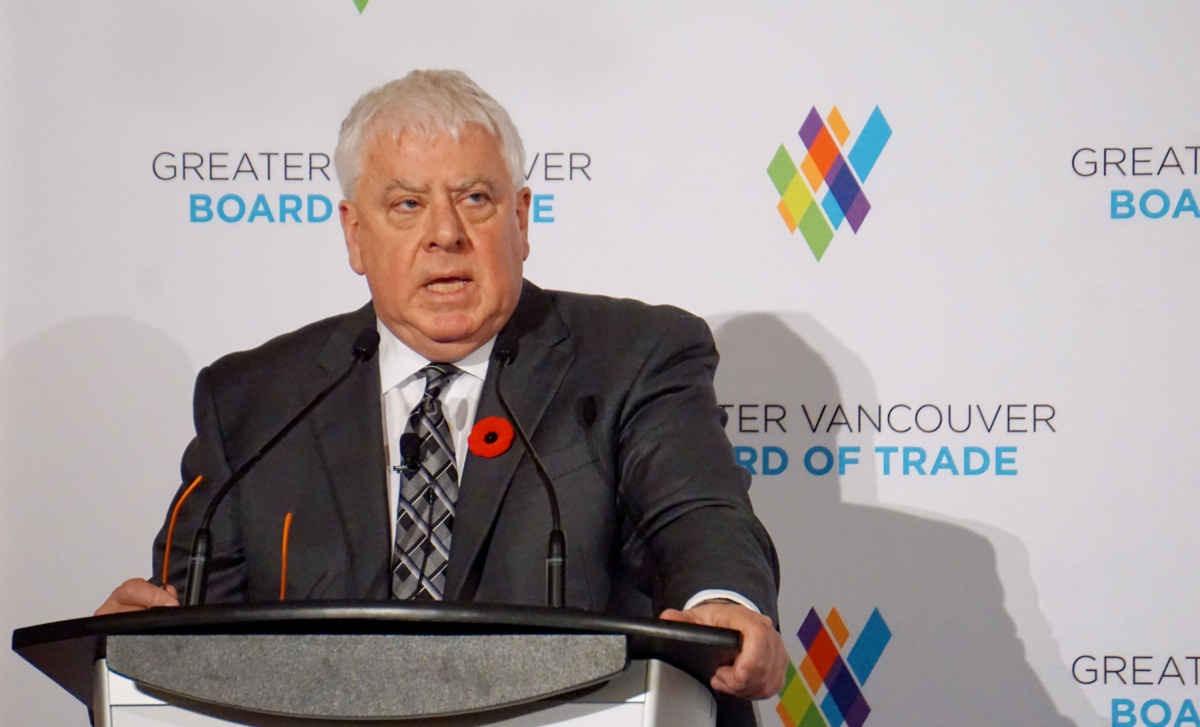

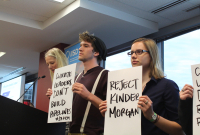
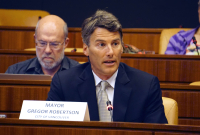

Comments
Let's wait another year as the production of green energy in Alberta supersedes the need for a new pipeline. Let's use the existing pipelines until they become outdated. With communities (Vancouver et al.) and aboriginal groups saying 'no', and should that represents 'the majority', let's go with 'the majority' and take the consequences - prices at the pump, heating oil etc. 'The times they are a changing', and so they must! Our very survival is the outcome.
This sums it up!
“It is difficult to get a man to understand something, when his salary depends upon his not understanding it!" Upton Sinclair
Not smart enough to differentiate between the global scientific consensus on anthropogenic warming, and the junk science being produced by retainees of the fossil fuel industry?
Do a bit of reading Ian. And just the surface stuff will suffice. Like the Exxon suit being pursued in the States...BECAUSE....leaked documents make it clear your buds at Exxon knew decades ago what the consequences of continued fossil fuel extraction were going to be.
Two views on climate change???? Pure rubbish and corporate spin. And by now most people know that. So what I'm wondering, what is the required IQ for a corporate CEO? It can't be that high, if pleading ignorance on something as obvious as climate change is today, is a tack he can get away with.
And for all Liberals out there. Tell our good looking PM, that doing good is what we elected him for. Ian's just posted another gross selfie; no smart politician should follow in those footsteps.